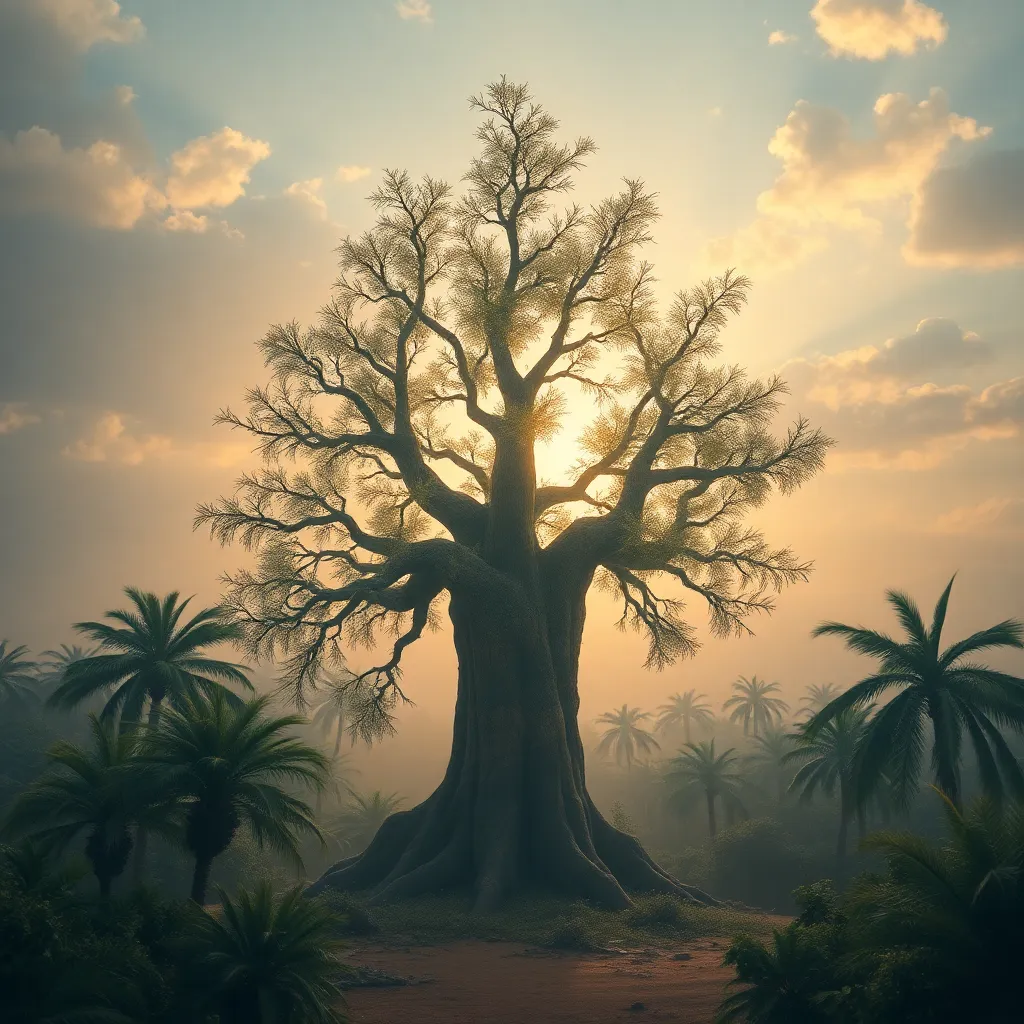The Myth of the Sacred Cedar in Egyptian Lore
I. Introduction
Egyptian mythology is a rich tapestry of stories and symbols that reflects the beliefs and practices of one of the world’s oldest civilizations. Central to its narratives are the gods, the afterlife, and the natural world, all of which intertwine to create a profound understanding of existence.
Among the many symbols found in Egyptian lore, the sacred cedar tree holds a unique place. Known for its strength and aromatic wood, the cedar has been revered not just for its physical properties, but for its deep spiritual significance as well.
This article seeks to explore the myths and symbolism surrounding the cedar tree in Egyptian culture, shedding light on its historical context, its connections to the divine, and its lasting legacy.
II. Historical Context of Cedar Trees in Ancient Egypt
Cedar trees primarily originate from the mountainous regions of Lebanon, where they have been prized for their durability and fragrance. Ancient Egyptians valued cedar wood for its quality and scarcity, leading to its incorporation into various aspects of their society.
- Geographic origins of cedar trees: The Lebanese mountains are home to the majestic cedar, known scientifically as Cedrus libani. These trees were transported to Egypt through trade routes, emphasizing their value.
- Importance of cedars in ancient trade: Cedar wood was a significant commodity in ancient trade networks, often exchanged for gold, grain, and other resources.
- Architectural and ceremonial uses: The Egyptians utilized cedar wood in the construction of temples, tombs, and furniture, due to its resistance to decay and insect damage.
III. Symbolism of the Cedar Tree in Egyptian Mythology
The cedar tree is imbued with a range of symbolic meanings in Egyptian mythology, often associated with the divine and the eternal.
- Associations with the gods and the divine: The cedar was linked to several deities, particularly Ra, the sun god, who was believed to have a sacred grove of cedars.
- The cedar as a symbol of strength and endurance: Its robust nature made the cedar a metaphor for resilience and immortality, qualities highly valued in Egyptian culture.
- Role in funerary practices and the afterlife: Cedar wood was often used in the construction of coffins and sarcophagi, as it was believed to protect the deceased in the afterlife.
IV. The Cedar in Egyptian Creation Myths
Cedar trees also play a significant role in the creation myths of ancient Egypt, symbolizing life and renewal.
- Connection to the creation of the world: In some myths, the cedar is seen as a fundamental element in the creation of the universe, representing the first life forms that sprung from the primordial waters.
- The cedar as a representation of life and renewal: Due to its evergreen nature, the cedar symbolizes eternal life and the cyclical nature of existence.
- Myths surrounding the primordial cedar: Tales suggest that the first cedar sprouted from the tears of the goddess Isis, marking it as a sacred tree of life.
V. The Cedar and the Pharaohs
The relationship between the cedar tree and the pharaohs is significant, as it underscores the divine qualities associated with kingship in ancient Egypt.
- Use of cedar wood in royal tombs and temples: Pharaohs were often buried with cedar wood artifacts, believing it would aid their journey in the afterlife.
- The relationship between pharaohs and the divine qualities of the cedar: The cedar’s strength and longevity mirrored the pharaoh’s role as a divine ruler.
- Legendary figures and their connection to the cedar tree: Figures such as Osiris and Horus were linked to cedar trees, further solidifying their significance in the royal narrative.
VI. Myths and Legends Involving the Cedar Tree
The cedar tree features prominently in various myths and legends that highlight its mystical properties and transformative powers.
- Tales of gods and goddesses associated with cedars: Deities like Hathor and Osiris are often depicted in sacred groves of cedars, symbolizing their connection to fertility and the afterlife.
- Folklore surrounding the cedar and its mystical properties: The wood was believed to possess protective qualities, warding off evil spirits and ensuring safe passage to the afterlife.
- Transformation and rebirth themes: Many myths emphasize themes of rebirth through the cedar, serving as a reminder of nature’s cyclical renewal.
VII. The Cedar’s Legacy in Modern Egypt
Today, the legacy of the cedar tree continues to resonate in modern Egypt, reflecting its historical importance.
- Influence of cedar mythology on contemporary culture and art: Artists and writers often draw inspiration from the rich symbolism of the cedar, incorporating it into their works.
- Preservation efforts and the importance of cedar trees today: There are ongoing efforts to protect cedar forests, recognizing their ecological and cultural significance.
- The cedar’s role in modern interpretations of ancient Egyptian beliefs: The enduring nature of cedar in modern spirituality echoes the ancient reverence for this sacred tree.
VIII. Conclusion
The sacred cedar tree holds a significant place in Egyptian lore, embodying strength, divinity, and the promise of renewal. Its historical and cultural importance spans millennia, influencing both the ancient and modern worlds.
As we reflect on the legacy of the cedar, we are reminded of its enduring symbolism in Egyptian mythology, inviting further exploration of the rich narratives that define this captivating culture.




